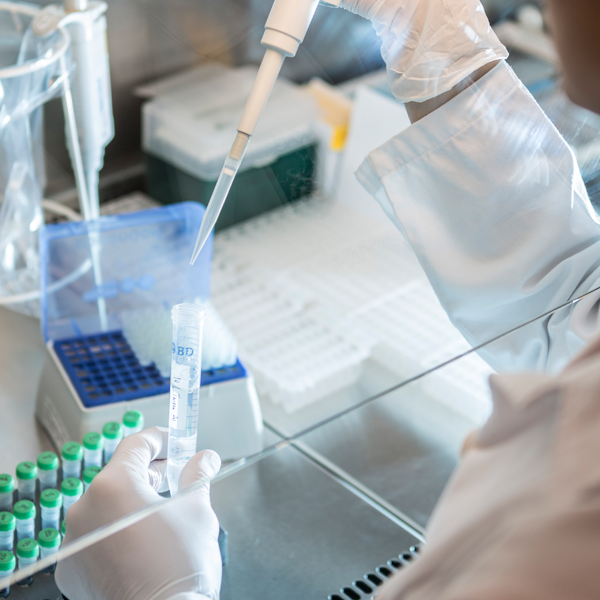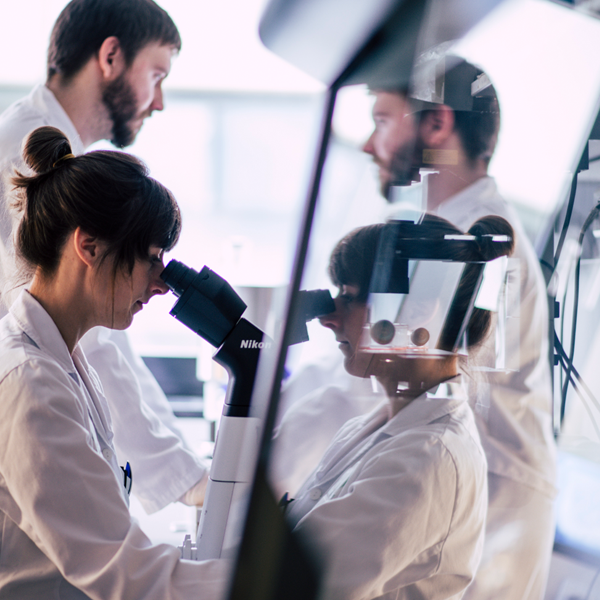- The University
- Studying
-
Research
- Profile
- Infrastructure
- Cooperations
- Services
-
Career
- Med Uni Graz as an Employer
- Educational Opportunities
- Work Environment
- Job openings
-
Diagnostics
- Patients
- Referring physicians
-
Health Topics
- Health Infrastructure
Molecular Inflammation (DK-MOLIN)
DK-MOLIN is an educational program at the Medical University of Graz (MUG), based on equal financial support by the ‘Doktoratskolleg’ (DK) scheme of the Austrian Science Fund (FWF) and the MUG. MOLIN offers a multidisciplinary graduate training program that scrutinizes the molecular and cellular mechanisms involved in the pathogenesis of inflammatory diseases, the pathogenic role of inflammation in diseases, and novel therapeutic targets to modulate inflammation using a wide range of state-of-the-art techniques.
Inflammation is a two-edged sword: In the physiological context, inflammatory processes are concerned with host defense against pathogens, with wound healing and tissue regeneration. Under pathological conditions, however, inflammation may turn against the host, causing tissue damage, organ dysfunction and chronic disease. Inflammatory diseases are a major cause of morbidity, disability and mortality worldwide. Beside classical inflammatory disorders such as infectious, rheumatoid or allergic diseases, inflammation is also a key pathogenic feature of cardiovascular diseases like atherosclerosis and pulmonary hypertension, metabolic diseases like diabetes mellitus and osteoporosis, and neurodegenerative diseases like multiple sclerosis or Alzheimer's disease. Moreover, inflammation shows its Janus head in cancer: Chronic inflammation has been discovered as one of the main triggers of tumor initiation and promotion but it also has the capacity to control neoplastic disease and critically impact on the response to therapy. Moreover, inflammatory responses may also arise from anti-tumor therapy itself causing severe, sometimes life-threatening, side effects.
As inflammation research continues to gain increasing significance for public health and economy, the DK-MOLIN copes with the growing demand for scientists in inflammation research with a solid background in molecular biology, cellular physiology, immunology, and translational research. The DK-MOLIN focuses on student education based on a multidisciplinary approach that transverses the boundaries of traditional subjects, and closely associates basic research with clinical science, thereby creating a fruitful environment for clinically relevant basic research and focusing on a translational approach to inflammatory conditions. The close proximity between clinical research infrastructure, clinical centers, and basic research laboratories facilitates intellectual and technological exchange between students and faculty. To tackle the major challenge of combining the many different aspects relevant to inflammation research into one training program, MOLIN offers highly competitive thesis projects covering both basic and translational research with defined clinical implications. DK-MOLIN students can access a wide range of techniques and are hence able to advance their thesis projects in due time, the experts in this initiative have been chosen with respect to diverse technical competence both in basic and translational research as well as clinical medicine. Thus, the program offers an in-depth and multidisciplinary training in a large variety of scientific methods which is attractive for graduates both from life sciences and medicine who intend to pursue a career in academia or industry.




